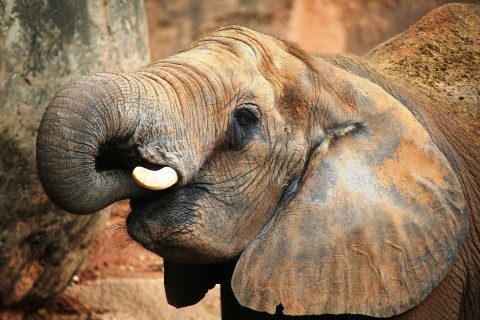Humans were created as the image of God (Gen. 1:26). We are not to make images of God (Ex. 20:4) because God has already made images of Himself, and they are us! From before the creation of the world, God planned a physical representation of Himself in the world. This representation was not to look like God, for God is spirit and not physical. In a certain sense this representation was not even to have God’s attributes, because God is infinite and any created being could at most only have a tiny, limited measure of any of His attributes.
Rather, humans were to be His representation because God declared them His representation. As in the case of our rulership status, our image status is not because we deserve it, but because He decided to make us His image. He did in fact grant us some tiny measure of His attributes, but only so that we could better image Him—so that we could bring more glory to Him. Just as a king of Egypt might design a ring to represent his power or have a statue or a building constructed to represent his person or kingdom, God designed and fashioned humans to be a representation of His person, kingship, and kingdom. We have the status of image whether we’re a good image or a bad one, and whether we want to be an image or not. Nonetheless, it would be better if we imaged Him well. The study of biology can help a Christian be a better image of God in at least three different ways.
Through Biology We Can Better Care for Our Bodies. Because God is spirit we cannot ‘look’ like God, but our bodies are visual representations of God, nonetheless. The way in which we appear to others is the representation of God we offer to them. For as long as we are alive and in whatever we do, we are a visible representation of God. This is reason enough for humans to care for their bodies, so as to illustrate God well. For believers, however, there is an additional reason. The body of a believer is also home to the Holy Spirit—thus the very temple of God (I Cor. 3:16-17; 6:19-20; II Cor. 6:16).

If God lived in a particular building we would take great care to see that that building was well cared for. In fact, God does live in a building—not one built by human hands—but a building God created: the body of the believer. Christians should take great care to see that their bodies are well cared for. Biology gives us insight into the workings of our bodies. The more we know about our bodies, the better we can maintain our bodies and care for the temple of God. Although the structure of the human body is not the focus of this text, I pray that what is said about the human body will help you better maintain the temple He has given you. In this way you can better image God.

Through Biology We Can Make Better Ethical Decisions. As the image of God, Our bodies are a physical representation of God. At the same time our decisions are a moral representation of God. We are to do right—to make the decisions that God would make. To be the best possible image of God, we should be perfect as He is perfect. So we are commanded (e.g. “Be holy, for I am holy”: Lev. 11:45 & I Pet. 1:15-16; “…let us …perfect holiness…”: II Cor. 7:1).
Part of that command to be perfect is fulfilled as we stop wrongdoing and do the right things instead. Yet, to do right in a given situation we need to understand enough about the situation to understand what is right and wrong. For example, if a person does not know that most IVF (in-vitro fertilization) procedures involve abortion, he or she may think that all IVF procedures serve only to promote life. Do the different birth control methods differ in ethics, or risk of abortion, or danger to the body? What about genetic engineering, or cloning? Are some methods displeasing to God? Are some honoring to God? Human technology permits us to do things we never dreamed of before, and human technology of the future will allow us to do even more. Which of these things are right and which are wrong? What about the changes in global climate, pollution, extinction, and human population? Which should be stopped and which should be allowed to continue? And what is the best way of doing what is right?
Learning biology and the language of biology can help us to know what is right and wrong in a host of bioethical situations. Biology can help us obey God’s command to do what is right, and thus be better images of God. I pray that the ethics comments scattered through the text will help you to be holy as He is holy.
Through Biology We Can Learn to Respect God’s Word Over Man’s. We have been commanded to worship God and only God (e.g. Exo. 20:3-6), and we are to fear God and only God (Deu. 13:4). We are not to worship or fear the creation, we are not to worship or fear the idols that we make, and we are not to worship or fear other humans. In part this is because we are the image of God. It would not be appropriate for God to worship or fear anything He had created, so it is not appropriate that His image should be seen worshiping or fearing anything God created. Our awe and worship should be directed only towards God.
Down through the centuries, a number of challenges to Christianity and the Bible have come from the field of biology. Even many Christians have listened to the critics rather than God. As a result, they have questioned Christianity, they have doubted God, and they have questioned God’s word. And this is within the ranks of Christianity! Such things should never happen. The conclusions of science are tentative truths, and this can be demonstrated by a study of science. God’s Word carries more weight than biological challenges to it, and this can be demonstrated by a study of biology. For example, because biological evolution is a substantial challenge to Scripture in our day, critiques of evolutionary theory are found throughout the text. I pray these critiques will encourage you to embrace the claims of God over the claims of man, and thus better image God. I also pray that the overall effect of this course would lead to the strengthening of your faith, and that you would wholeheartedly embrace the claims of Scripture, becoming thereby immune to any efforts to undermine the authority of the Bible.

Biology and Our Service to Others
To a large extent, the reasons for studying biology that we have considered so far are a fulfillment of the first great commandment (Mat. 22:37-8). As we function as priests and kings of the creation and images of God, we love the Lord our God with all our heart, soul, and mind. The second commandment is to love others (Mat. 22:39). The study of biology can help a Christian better minister to the needs of others in at least three different ways.
Through Biology We Can Better Meet the Physical Needs of Others. One of the ways we love others is by serving them (Gal. 5:13-14). Studying the biological world has the potential of providing knowledge which we can use to meet the needs of others (e.g. to treat disease, provide food crops, and advise in bioethical dilemmas). An accurate understanding of the human body can allow a better understanding of the physical responses and needs of others. Even an understanding of the theories of science which oppose Scripture can permit us to more effectively minister to those who accept those theories. I pray this course will improve your overall ministry to others, and thus allow you to better obey the second great commandment.
Through Biology We Can Better Meet the Spiritual Needs of Others. Rom. 1:19-20 tells us that God uses His creation to introduce Himself to humans. If God can use His creation to illustrate Himself to humans, we should be able to use His creation to lead unbelievers to Him and believers closer to Him. As we learn more about the creation, we should be able to discover more ways to share God with others. At the very least, an understanding of science will broaden and round a person’s general knowledge, which in turn will allow discussion of a wider range of topics with others.
Learning biology should provide more opportunities for common ground in discussions and should make the Christian a more interesting person to others. And, as we become familiar with more biological illustrations of God’s attributes we also learn more ways to introduce God to others. In this fashion, a study of biology can help us better love others by ministering more effectively to their spiritual needs. I pray that this text increases the effectiveness of your own evangelistic efforts.
Through Biology Christian Biologists Can Be Salt and Light to Other Professionals. Unbelievers everywhere need a Christian example. Christians are called upon to be salt and light in our world (Mat. 5:13-16) and to evangelize the world (Mat. 28:18-20). In whatever profession, in whatever position (e.g. friendship), with whatever authority (e.g. advising or voting) that believers possess, believers should introduce the world to the Gospel, a Christ-like lifestyle, and to Biblical morality and ethics. Unbelieving scientists, for example, need the testimony of believers. God has called some of his children to pursue the science of biology and be the salt and light that that discipline needs. I would be thankful indeed if this text were to stimulate someone to follow God’s calling into professional biology.


